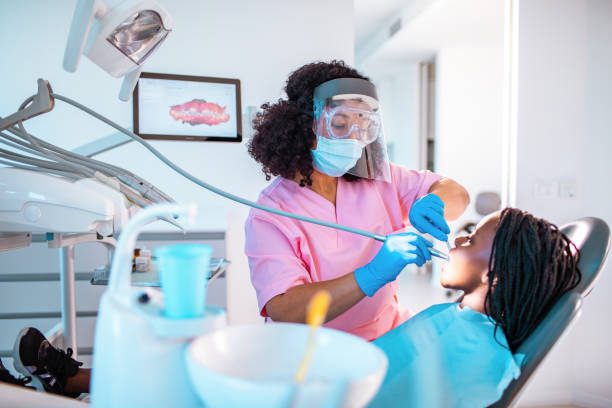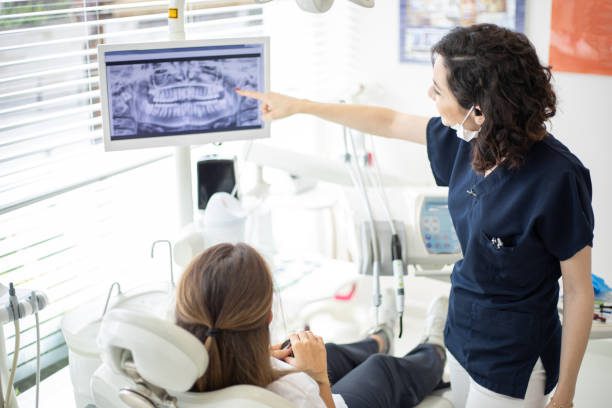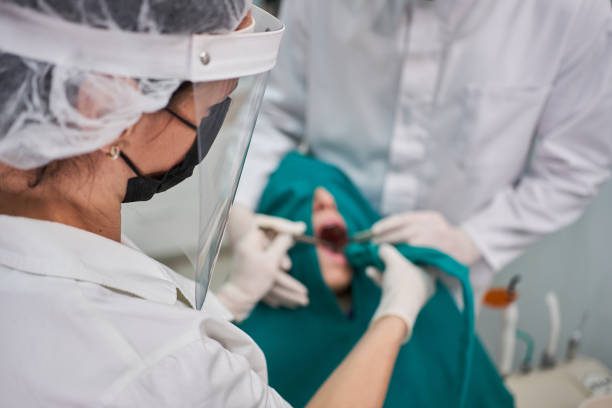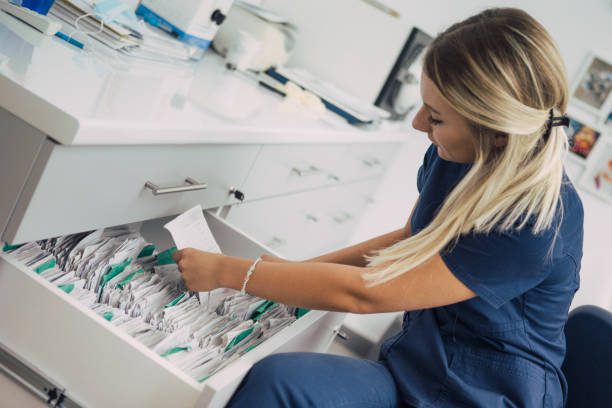
Irrespective of where you start your dental career, you will make a good salary, help scores of people regain their confidence to smile, and work in a field you enjoy.
Dental careers are always in demand, and you can pursue many different paths focusing on dental hygiene and oral health.
The accessible career options depend on your academic and employment credentials.
As dental professionals, we must work effectively as team players to give value to the client.
The following summarizes the various career options available in the dental industry.
1. Dental Hygienist

Why Become a Dental Hygienist?
When it comes to cleaning teeth, doing oral examinations, and giving preventive services under the guidance of a dentist, a hygienist has far more responsibilities than an assistant.
Among the topics they cover is how to maintain dental health.
You help improve the clients’ dental health and only need an associate’s degree in dental hygiene to begin.
Dental hygienists will have a good career path according to the BLS.
Dental hygienists must get licensed in all states, but each state’s requirements vary.
| Dental Hygienist Key Stats | |
|---|---|
| Education | 4+ Years |
| Outlook | 11% |
Read the full career guide: How to Become a Dental Hygienist
2. Dentist

Why Become a Dentist?
A doctoral degree is the starting point for a dentist.
For the sake of their patient’s oral health, they offer several services that focus on disease prevention and treatment through regular examinations.
It is possible for general dentists to offer more advanced treatments like bridgework and denture fitment or to refer the patient to specialized dental practitioners.
Dentists must hold a valid license in the states where they practice.
Some states want applicants to graduate from an accredited dental school.
| Dentist Key Stats | |
|---|---|
| Education | 4+ Years |
| Outlook | 7% |
Read the full career guide: How to Become a Dentist
3. Dental Technician

Why Become a Dental Technician?
Dental lab techs play a significant role in making dental prosthetics such as dentures, crowns, and bridges.
Specialties in this field include ceramics and orthodontic appliances.
There are four major dental technology disciplines: orthodontics and auxiliaries, maxillofacial prosthesis, detachable prosthesis, and fixed prosthesis.
The BLS recommends that dental laboratory technicians have a high school diploma or an equivalent.
You can earn an associate’s degree or a postsecondary certificate in dental laboratory technology at various educational institutions.
| Dental Technician Key Stats | |
|---|---|
| Education | 4+ Years |
| Outlook | 11% |
Read the full career guide: How to Become a Dental Technician
4. Orthodontist

Why Become an Orthodontist?
Orthodontists are experts at aligning the teeth and jaw.
Their procedures usually involve braces and other orthodontic appliances and strategic methods for realigning teeth.
Orthodontists prefer to work with children because their teeth can move more quickly.
However, orthodontists see adult patients as well.
Clients with serious jaw ailments may find orthodontists in the medical center, where they aid or communicate with them during their treatment.
Postdoctoral training, they’ll need to specialize in this field.
| Orthodontist Key Stats | |
|---|---|
| Education | 2-4 Years |
| Outlook | 7% |
Read the full career guide: How to Become an Orthodontist
5. Oral Surgeon

Why Become an Oral Surgeon?
Surgery on the mouth and jaw is what an oral and maxillofacial surgeon (OMS) does.
They can fix a client’s jaw issue or improve anything abnormal with their treatment.
Patients who have suffered a sizable facial fracture may benefit from surgeons who specialize in reconstructive surgery.
There are many workplaces for oral and maxillofacial surgeons, including hospitals, dental practices, and owning their practice.
They must earn postdoctoral qualifications.
| Oral Surgeon Key Stats | |
|---|---|
| Education | 4+ Years |
| Outlook | 7% |
Read the full career guide: How to Become an Oral Surgeon
6. Medical Records Clerk

Why Become a Medical Records Clerk?
There is a high demand for dental assistants.
The Bureau of Labor Statistics (BLS) predicts that the number of dental assistants will rise by nearly 20% up to 2026 due to continued studies correlating oral and general health.
Assisting a dentist is the job of a dental assistant.
X-rays are prepared and developed by the dental assistant, as are dental impressions and molds taken of patients’ teeth.
In addition, they assist patients with their procedures and educate them on proper oral hygiene afterward.
Some of the advanced duties include topical anesthetics, applying sealants, and applying fluoride.
Aside from scheduling appointments, dental assistants can also help with other facets of the practice.
Dentist assistants can choose from several training programs.
Some states require that you complete an accredited program and pass a state examination.
Any other states require no formal educational requirements.
| Medical Records Clerk Key Stats | |
|---|---|
| Education | 0-6 Months |
| Outlook | 11% |
Read the full career guide: How to Become a Medical Records Clerk









